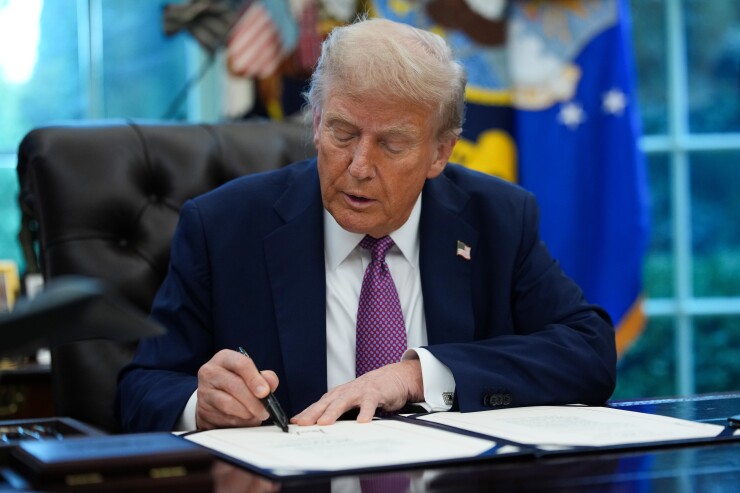Housing finance experts have a myriad of ideas for President Donald Trump should he declare a national housing emergency.
Treasury Secretary Scott Bessent
"This administration says 'we're investing into the American citizen,'" said Kimber White, president-elect of the National Association of Mortgage Brokers. "What better way than to give them some housing assistance to purchase homes, or builder incentives?"
Industry veterans are encouraging greater use of existing tools, like title insurance alternatives, and changes like curbing guarantee fees and loan-level pricing adjustments. The discussions come as the stalled housing market stands to become a greater factor in next year's midterm elections.
Can the government declare a national housing emergency?
President Trump hasn't been shy about declaring national emergencies to advance his agenda, including
"A potential National Housing Emergency being declared by the President is further recognition of how important housing is to this administration and to all Americans," said Mat Ishbia, president and CEO of United Wholesale Mortgage, in a statement.
Ishbia, like other home lending leaders, said UWM would support initiatives to lower interest rates and help current homeowners save money.
Alex Jacquez, chief of policy and advocacy at the Groundwork Collaborative think tank, said such a declaration would task Cabinet secretaries to assess their tools to lower housing prices. As a former member of the White House National Economic Council during the Biden Administration had been called on to review one of Trump's then-lingering national emergency declarations regarding mineral supply chains.
"The macro-structural impacts are much more important than any kind of tweaks around the edges the Trump administration could make though," he said.
Some actions, Jacquez said, could include easing up on existing policies regarding tariffs on building materials or immigration enforcement curbing construction labor.
The federal measures lenders want to see
The industry also isn't shy about the wishlist of actions it wants to see from the government. Some proposals were described by sources as marginal, but constructive.
Rich Swerbinsky, a longtime industry leader and executive director of the Ohio Mortgage Bankers Association, in a LinkedIn post last week summarized familiar industry calls to action such as more appraisal waivers,
"The most likely thing they do in my opinion is more broad
White, who will begin his second stint at NAMB president Oct. 1, suggested feds should step in regarding
How should the government address mortgage rates?
The Community Home Lenders of America, in a letter from independent mortgage banks to regulators last week, called on Fannie Mae and Freddie Mac to
The trade group also called on feds to keep g-fee parity intact should the government-sponsored enterprises exit conservatorship. Some mortgage experts called for slashing g-fees and LLPAs, a proposal CHLA Executive Director Scott Olson weighed.
"It's not that they're insignificant," he said. "A cut in those is insignificant compared to even a small movement down in mortgage rates, in terms of affordability."
Cutting the two costs is also untenable amid
"Lowering them is going to increase homeownership," he said. "It will offset what you're lowering your fees by, because now you're spurring the economy with more buyers, more builders."
Separately, Swerbinsky pointed to a bank-specific regulatory change that could nudge rates. Bessent has discussed
Tax relief
Experts also discussed tax measures as national emergency levers. Tax credits for first-time homebuyers could be positive, said Hector Amendola, president of Panorama Mortgage Group.
"However, a tax credit and rates coming down can be 2020/2021 type price increases that can really put housing out of reach for many," he said in an emailed comment. "I remember being in the market for a home during the last tax credit in 2009 and how difficult it was to buy a home at the time for first-time homebuyers."
Others have offered proposals around the
Waiving the capital gains tax on all home sales would be "ridiculously expensive", said Swerbinsky. Rather, waiving them on the sale of less-prevalent investment properties sold to owner-occupiers could be a popular solution.
"It would be a huge carrot incentive for people to list homes," he said.
The CHLA last month offered a separate proposal
White was more skeptical of the capital gains waiver proposals, questioning how investors would utilize the tax break. Although investors have taken a step back from their spending spree during the refinance boom, they still own millions of homes nationwide, many which are
No matter which lever the government pulls, experts emphasized that rate reductions remain paramount.
"Now is the time that every loan originator needs to open their eyes," said White. "Every mortgage broker, every housing group, and we need to collaboratively work together to make something happen."





